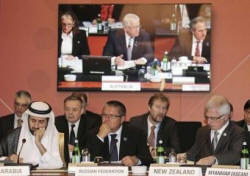|
 Concerns
mount over India's stance on global trade pact Concerns
mount over India's stance on global trade pact
 Send a link to a friend
Send a link to a friend
[July 19, 2014]
By Matt Siegel
SYDNEY (Reuters) - Eleventh hour
negotiations to win Indian approval for a breakthrough global trade
pact may not have succeeded in the end despite initial signs of
progress, sources involved in the discussions said on Saturday. |
|
 India is the most prevalent among a group of developing nations
angry at rich countries for failing to address their concerns about
a deal on trade facilitation - struck by WTO member states in Bali
last year - that must be detailed by a July 31 deadline. India is the most prevalent among a group of developing nations
angry at rich countries for failing to address their concerns about
a deal on trade facilitation - struck by WTO member states in Bali
last year - that must be detailed by a July 31 deadline.
Proponents believe the deal could add $1 trillion to global GDP and
21 million jobs.
But India’s Trade Ministry said on Wednesday it would “find it
difficult" to support the protocol unless it was satisfied that
adequate emphasis is being placed on negotiations about food
security and other issues important to poor countries -sparking
furious negotiations at the G20 Trade Ministers meeting in Sydney.
Three officials involved in the negotiations, speaking under the
condition of anonymity in order to speak frankly, expressed
exasperation with what they described as a history of erratic
behavior on the part of the Indian trade team that made it difficult
to trust.

India has not provided any clear description of exactly what changes
it would like made to the agreement, they said, although it would
not matter anyway because no concessions were on offer given how
difficult the negotiations had proven to conclude the first time
round.
The Indian demands appear to have shaken confidence in the new
government of Narendra Modi, who came to power earlier this year
with a pro-business agenda but now appears set to derail what
several officials called the most significant global trade pact in
two decades.
Australian Trade Minister Andrew Robb said assurances had been given
to all of the signatories to the treaty that their concerns would be
met and expressed optimism that it would be resolved before the
deadline.
"There was strong resolution around the table that India’s issues to
do with food security would and should and will be addressed as
decided previously and I think there will be discussions about how
to satisfy the Indians and they won’t be left behind," Robb told
reporters.
[to top of second column] |

The row over subsidies has raised fears that the so-called "trade
facilitation agreement", the first ever global trade agreement under
the World Trade Organization, will be derailed.
A deal was only reached after New Delhi extracted promises that its
concerns related to food subsidies would be addressed.
India stockpiles food for its poor, putting it at risk of breaking
current WTO rules. In Bali, WTO members agreed to give India a pass
until 2017, while negotiating a permanent solution.
"We are focused on implementing the full Bali package that will
deliver for every country involved," said Michael Froman, the U.S.
Trade Representative. "Reinvigorating the multilateral system is too
important to put at risk with any backsliding on commitments."
(Editing by Lincoln Feast and Sophie Walker)
[© 2014 Thomson Reuters. All rights
reserved.] Copyright
2014 Reuters. All rights reserved. This material may not be
published, broadcast, rewritten or redistributed.

 |